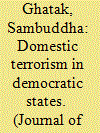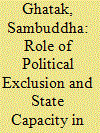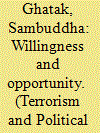| Srl | Item |
| 1 |
ID:
164160


|
|
|
|
|
| Summary/Abstract |
Scholars continue to disagree on the relationship between regime type and political violence, perhaps because the empirical evidence remains contradictory. To date, most studies generally explore the direct relationship between democracy and terrorism. Yet, we think the effect of regime type on terrorism is conditional on the presence of politically excluded groups whose grievances motivate them to challenge the state. We need to take into account both willingness/grievance and opportunity to understand political violence. Using a global data set of domestic terrorism between 1990 and 2012, we find that different regime-associated features of democracy relate differently to domestic terrorism. Higher levels of the rule of law tend to decrease terrorism, whereas electoral democracies tend to experience more domestic terrorism. However, domestic terrorism increases in every form of democracy in the presence of political exclusion. As such, an effective counterterrorism policy must address underlying grievances as democratization by itself may actually drive domestic terrorism up.
|
|
|
|
|
|
|
|
|
|
|
|
|
|
|
|
| 2 |
ID:
159885


|
|
|
|
|
| Summary/Abstract |
Extant literature on intrastate conflict independently explores terrorism and civil war. However, both terrorism and civil war are probably parts of a continuum of intrastate conflict with the former at one end and the latter at the other end in terms of intensity. I argue that two factors play important roles in rebels’ decision-making calculus, namely, the size of their support base and state strength. Terrorism, as a strategy of the weak, is optimal when the rebel groups have little support among their audience and the state is strong. On the other hand, guerrilla warfare is an ideal strategy when such groups have a greater support base and the state is weak. The theoretical argument is tested on a dataset of Myanmar and six countries of South Asia and for 1970–2007.
|
|
|
|
|
|
|
|
|
|
|
|
|
|
|
|
| 3 |
ID:
144922


|
|
|
|
|
| Summary/Abstract |
Domestic terrorism, as a form of intrastate violence, has varied widely in South Asia along with the post-Cold War period of global economic integration and political openness. How are these two phenomena—economic integration and emergence of democracies—related to domestic terrorism in South Asia? I argue that resorting to terrorism is a rational choice when individuals'/groups' cost of heterogeneity—deprivation from public goods due to geographical and ideological distance—increases; opportunity is provided by democratization and integration into the global economy. The testable hypotheses derived from the theory are empirically tested on a dataset of five South Asian countries for the time period between 1990 and 2007. The results show that both minority discrimination and presence of unconsolidated democratic institutions increase terrorism in the highly heterogeneous South Asian countries. International trade in the presence of minority discrimination increases homegrown terrorism, but foreign direct investment neither increases nor decreases such incidents.
|
|
|
|
|
|
|
|
|
|
|
|
|
|
|
|